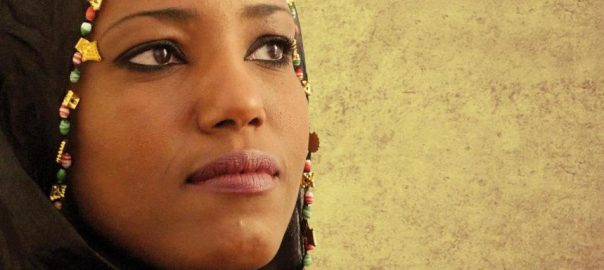Amsterdam – The liner notes of the third and newest album of Aziza Brahim, Soutak, has a strong message. “If things are not set right soon, we, the native people of the Western Sahara (“Saharawis”), will have traveled a road of some 40 years since our land was invaded, ravaged and robbed. A path that leads from napalm bombs to landmines; a route encompassing the exodus to the refugee camps in the South of Algeria and the cruel devastation and unjust condemnation of the brave Gdeim Izik (Camp of Dignity); a march from medieval colonialism to neoliberal imperialism; all of it face to face with the silent complicity of the large international organizations.” Aziza Brahim (1976) was born and raised in the Saharawi refugee camps in the Tindouf region of Algeria where her family settled, after fleeing from the Moroccan occupation of Western Sahara. When she was 11 years old, she journeyed to Cuba to pursue her secondary school studies. Back in the refugee camps she committed to self-education and the development of her own musical expression. Now many years, awards, movies, and three albums later, her album Soutak has reached number 1 of the European World Charts. She appeared in the TV show of Jools Holland (UK), and last week she was in Amsterdam to perform at the TV show Vrije Geluiden. News & Noise spoke to her shortly before she had to return to Barcelona.
by Charlie Crooijmans
The lyrics on your album Soutak seem to be very political. Can you be seen as a spokeswoman of the liberation front Polisario?
“No, I am not a politician. I am one of three generations who lives in a refugee camp and I represent my life and music. I feel the urge to give my music a context. The Saharawi live under Moroccan control and we are not allowed to express ourselves culturally. If we don’t protect our culture, our people will vanish. We have an oral tradition. How can we respect ourselves if we don’t have an identity? The lyrics are not only about the Saharawi, but about the suffering of other people as well. There is a global dimension. Every song tells a true story, and it’s not always about politics.”
Soutak differs musically from your second album Marhabna. It’s more quiet and in an acoustic setting. The album is produced by Chris Eckman (Tamikrest, Samba Touré). Can you tell me more that?
“On Soutak you will hear Arabian, Andalusian, African and Latin influences, from the countries where I have been. Like in Cuba, which I consider as my second homeland, because I haven’t lived that long anywhere else. On the other hand, Marhabna is more influenced by pop and rock, because the lyrics needed an energetic drive. I met Chris Eckman while working on that album. We share the same ideas of sound and we decided to work together on Soutak. I am very pleased with that. Also with the musicians. With some of them I’ve worked before. They live nearby (in Catalonia) and they have a personal style which turns the music into a rich and beautiful whole.”
In the liner notes of your album Soutak you refer to the situation in Mali…
“I have never been there, but Mali is seen as the cradle of the African music. I am as African as Arabian and I can relate myself to what happens over there – the extremists trying to ban the music not long ago – that’s why I want to show my support. Moreover, the music has always appealed to me. I am a big fan of the late Ali Farka Touré. You will hear some influences of the Desert-blues, especially in the song Lagi. The main guitarist on Soutak is Kalilou Sangare from Mali.”
You play the tabal, what kind of instrument is it?
“The tabal is a drum typical of the Saharawi culture. Traditionally women only play it. I use the rhythms of the tabal in my compositions.”
How did you start in music?
“As a child I joined every Friday (holy day) singing Islamic chants. And my family and I composed melodies for the poets of my grandmother. She encouraged me to join her at her performances.”
In the refugee camps you could hear religious and non-religious music like Haul en Rai. Has the singer Mariem Hassan been an example for you?
“I have been working together with Mariem Hassan. She is an important singer in my country. But we do different things. Although I admire her route, I am far more inspired by the survival instinct of the Saharawi and my grandmother! My grandmother is also known as the ‘poet with the gun’. Everything that happened during 15 years of war, she transmitted into poems. Therefore she is the memory and the voice of the Saharawi people.”
